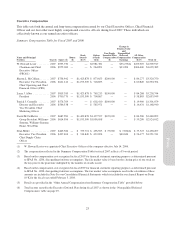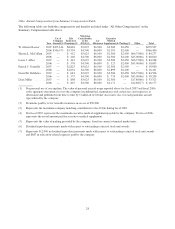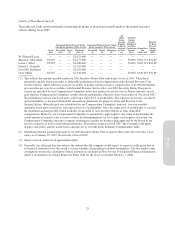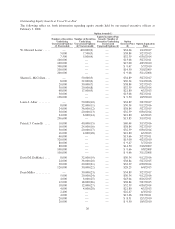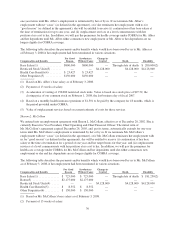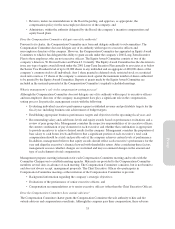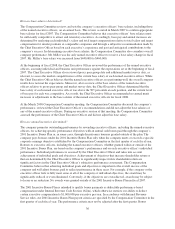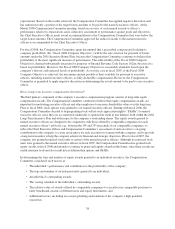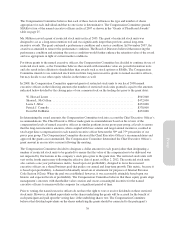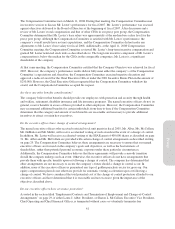Pottery Barn 2007 Annual Report Download - page 123
Download and view the complete annual report
Please find page 123 of the 2007 Pottery Barn annual report below. You can navigate through the pages in the report by either clicking on the pages listed below, or by using the keyword search tool below to find specific information within the annual report.
• Reviews, makes recommendations to the Board regarding, and approves, as appropriate, the
compensation policy for the non-employee directors of the company; and
• Administers, within the authority delegated by the Board, the company’s incentive compensation and
equity-based plans.
Does the Compensation Committee delegate any of its authority?
Pursuant to its charter, the Compensation Committee may form and delegate authority to subcommittees. The
Compensation Committee does not delegate any of its authority with respect to executive officers and
non-employee directors of the company. However, the Compensation Committee has appointed an Equity Award
Committee to which it has delegated the ability to grant awards under the company’s 2001 Long-Term Incentive
Plan to those employees who are not executive officers. The Equity Award Committee consists of two of the
company’s directors, W. Howard Lester and Patrick J. Connolly. The Equity Award Committee has the discretion to
issue any type of equity award allowed under the 2001 Long-Term Incentive Plan annually to associates at or below
the Senior Vice President level of up to 20,000 shares to any individual and an aggregate of 400,000 shares of the
company’s common stock to all individuals. Any 1 share granted as deferred stock, restricted stock or a restricted
stock unit counts as 1.9 shares of the company’s common stock against the maximum number of shares authorized
to be granted by the Equity Award Committee. Reports of grants made by the Equity Award Committee are
included in the materials presented at the Compensation Committee’s regularly scheduled meetings.
What is management’s role in the compensation-setting process?
Although the Compensation Committee does not delegate any of its authority with respect to executive officers
and non-employee directors of the company, management does play a significant role in the compensation-
setting process. In particular, management assists with the following:
• Evaluating individual executive performance against established revenue and profitability targets for the
fiscal year, including business unit achievement of budget targets;
• Establishing appropriate business performance targets and objectives for the upcoming fiscal year; and
• Recommending salary and cash bonus levels and equity awards based on performance evaluations and a
review of peer group data. Management considers the respective responsibilities of its executive officers,
the current combination of pay elements for each executive and whether that combination is appropriate
to provide incentives to achieve desired results for the company. Management considers the proportion of
base salary to cash bonus levels and believes that a significant portion of each executive’s total cash
compensation should be at risk and payable only if the company achieves certain levels of performance.
In addition, management believes that equity awards should reflect each executive’s performance for the
year and align the executive’s financial reward with shareholder return. After considering these factors,
management assesses whether changes are warranted and may recommend changes in the amount and
type of each element of total compensation.
Management prepares meeting information for each Compensation Committee meeting and works with the
Committee Chairperson to establish meeting agendas. Materials are provided to the Compensation Committee
members several days in advance of each meeting. The Compensation Committee considers, but is not bound to
and does not always accept, management proposals. The Chief Executive Officer also participates in
Compensation Committee meetings at the invitation of the Compensation Committee to provide:
• Background information regarding the company’s strategic objectives;
• Evaluations of the performance of senior executive officers; and
• Compensation recommendations as to senior executive officers (other than the Chief Executive Officer).
Does the Compensation Committee have outside advisors?
The Compensation Committee charter grants the Compensation Committee the sole authority to hire and fire
outside advisors and compensation consultants. Although the company pays their compensation, these advisors
33
Proxy


